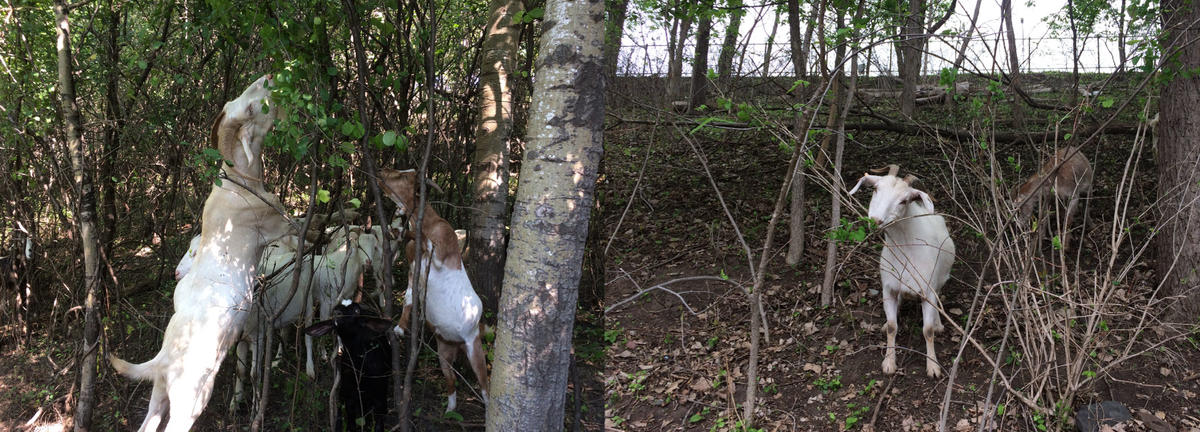
Background
Managing invasive plants is expensive and labor-intensive. The high cost of conventional tactics like mowing and herbicide application has led managers to look to less traditional methods of control such as use of browsing goats.
Goat management has surged in popularity, but proof that it works in the long-term is lacking. This project evaluated the lasting benefits of goat defoliation for buckthorn management and determined if feeding poses harm to the native plant ecosystem.
Another area of concern with goat management involves the deadly snail- or slug-borne parasite, Parastronguloides tenuis. Goats who eat an infected snail or slug while grazing can suffer a number of neurological symptoms ranging from paralysis to death. Some universities have recommended the use of grazing geese for snail and slug control, and this project tested that method for the first time on a goat grazing system.
Research questions
- How effective is goat browsing for long-term invasive species control?
- What are the effects, if any, of goat browsing on native plant diversity?
- Does goose grazing lower risk of the P. tenuis parasite in goat herds?
Outcomes
Targeted grazing by goats has some benefits for the control of invasive R. cathartica and the enhancement of native plant communities. However, goats provide only temporary suppression of R. cathartica abundance and the invasive shrub rebounds after grazing ends. In some cases of the study, native plant diversity reached higher levels following grazing treatments.
Consumption by goats kills the seed of R. cathartica, and other invasive plants with larger seeds, indicating that goats are unlikely to exacerbate invasions by spreading them to new areas.
While P. tenuis transmission to goats remains a concern during invasive plant management, co-grazing goats with waterfowl may mitigate this seasonal disease risk. Waterfowl did not negatively affect overall gastropod abundance or diversity.
Publications
- An evaluation of goat browsing and other restoration strategies in buckthorn-invaded woodlands and savannas (thesis by Sara Nelson, 2022)
- Can Co-Grazing Waterfowl Reduce Brainworm Risk for Goats Browsing in Natural Areas? (Eco Health, 2022)
- The effectiveness of using targeted grazing for vegetation management: a meta-analysis (Restoration Ecology, 2021)
- Goat Digestion Leads to Low Survival and Viability of Common Buckthorn (Rhamnus cathartica) Seeds (Natural Areas Journal, 2020)
News and media
- Grazing goats, popular buckthorn foes, come to Waseca County park (The Mankato Free Press, 2021)
- How effective is targeted livestock grazing? (UMN Twin Cities News, 2021)
- Goat grazing helps control buckthorn growth (UMN Twin Cities News, 2020)
- Meet the goats and humans fighting invasive plants, one munch at a time (Pioneer Press, 2018)
- Buckthorn-eating goats to debut in Minneapolis parks Tuesday (Star Tribune, 2017)
- Ahead of the Herd: How Goat-Grazing Research is Helping with Buckthorn Control (Minnesota Invasive Terrestrial Plants and Pests Center)
- Meet the Researcher: Katie Marchetto
- Meet the Researcher: Sara Nelson